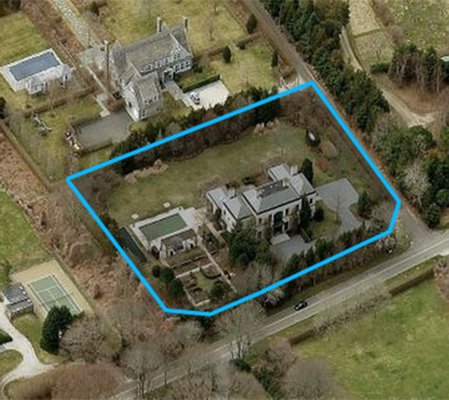
A house is in foreclosure at 80 Further Lane in East Hampton—right next door to a residential property at 60, 62 and 64 Further Lane that reportedly sold for a record-breaking $147 million.
The foreclosure may be a record-breaker in its own right. David Walsh owes $10.5 million to Es Ventures One LLC, which took over the note, according to State Supreme Court documents and Property Shark (http://propertyshark.com/). The property is scheduled to be auctioned off by attorney Daniel Murphy of Riverhead on June 10 at East Hampton Town Hall.
“This home is by far the most expensive residential foreclosure in my real estate career [of 12-plus years], of which I have spent the past seven years focused on becoming the go-to Hamptons foreclosure expert,” said Kristopher Pilles of East End Luxury Ltd., a Riverhead-based real estate brokerage that specializes in distressed properties in the Hamptons. “I am not aware of any other foreclosures to reach the eight-figure range, ever, in this region.”
He said to his knowledge a 2011 foreclosure on a house assessed at $2.28 million in Southampton had previously been the highest on the South Fork. The market value of the property at 80 Further Lane—an 8,000-square-foot house with eight fireplaces and an oversized pool on 1.8 acres—is estimated at $11 million.
According to the East Hampton Town assessors office, the only outstanding taxes are those due May 31 for 2013-14, a total of $56,538 plus interest to the town. In East Hampton Village, a total of $26,834, including penalties and fees, or $23,505 before penalties and fees, is due this August.
“It really is a tale of the haves and the have-nots of this economy—Further Lane, which you think is isolated from ... the economy,” Mr. Pilles said.
Yet there are more foreclosures in the Hamptons—even on expensive homes like those on Further Lane—than one might imagine. A few years back, Mr. Pilles counted 14,000 active foreclosures in Suffolk County, with 1,000 homes in the Hamptons with mortgages of more than $1 million in some form of default.
Thanks to a backlogged court system in New York State, some properties whose owners failed to make payments during the recession years are only now facing foreclosure, which can take as long as four years, Mr. Pilles said. “There is such a pent-up inventory of distress,” also called “shadow inventory,” he said. “At this point, we’re very busy, and there’s no indication it’s going to slow anytime soon.”
Mr. Walsh, who bought the Further Lane house for $2.7 million in 1999, could not be reached in Bronxville for comment as to why it went into default. Court documents indicate that loans originating in 1999 were consolidated into an $8.5 million loan in 2008 with Patriot National Bank, whose parent company in 2011 announced the sale of mortgage loans and underlying real estate to ES Ventures One LLC, according to an article at that time in The Stamford Advocate.
Mr. Pilles said there could be any number of reasons why anyone would default, from genuine hardship like a death in the family or the loss of a job to a strategic decision to negotiate a better deal with the lender.
“Chances are, if you’re on a street with more than 10 houses, you probably have somebody on your street not paying their mortgage,” he said.
Asked why someone wouldn’t sell before going into foreclosure, the broker said again there could be any number of reasons, including pride, fear, even “matrimonial situations where you have one spouse who wants to sell and one who doesn’t.”
Mr. Pilles said he has knocked on doors to discover a wife who was unaware that the house was underwater, year-round tenants who didn’t know they would have to vacate the premises at the beginning of summer, and summer tenants who’d paid tens of thousands only to discover they would have to reach out to an out-of-state financial institution to resolve problems like malfunctioning air-conditioning systems.
The fact that 80 Further Lane is in foreclosure and that 60, 62 and 64 Further Lane were reportedly sold without a broker, thereby escaping a hefty commission, held some irony in Mr. Pilles’s eyes. “If they had engaged a broker, it could have been leverage in the transaction,” he said, explaining that one might have argued that a foreclosure at 80 Further Lane would reduce the value of the neighboring property.
At any rate, Mr. Pilles said he has clients—“mostly hedge funds”—that have expressed interest in 80 Further Lane. “That street is very attractive,” he said. “It’s a beautiful property. I’ve driven by.”
The next owner is unlikely to need a mortgage. “You have to bring 10 percent in cash and have to close in 30 days, also in cash,” Ms. Pilles said of the auction process. “The buyer has to be someone who has $10 million liquid in cash.”